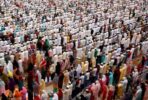When they were completed in 1998, the Petronas Towers in Kuala Lumpur were the tallest buildings in the world. At 1,483 feet, they beat out Chicago’s Sears Tower — which had held the record since 1973 — by only 10, but all the same, the superlative was a trophy for a Southeast Asian nation that had transformed itself from a sleepy agrarian society into a crucial economic center in less than a quarter of a century. Specifically, they were a point of pride for Prime Minister Mahathir Mohamad, who had led Malaysia in its rebirth; so personal was the accomplishment that he himself chose the fixtures in the skyscrapers’ bathrooms.
On Saturday, Mahathir was one of the many of thousands of people who gathered in the shadow of the towers to demand that Malaysia’s current Prime Minister, Najib Razak, step down from office. “Time has come for us to topple this cruel regime,” Mahathir said, standing on a portable stage before a crowd of roaring supporters dressed in yellow. “Najib is no longer suitable to be the prime minister. He is abusing the law.”
Saturday’s protest, organized by a group of pro-democracy and anti-corruption activists collectively known as Bersih (the Malay word for “clean”), was the second massive display of outrage towards Najib since July 2015, when the Wall Street Journal and investigative news website Sarawak Report reported that his personal bank accounts held nearly $700 million in cash apparently siphoned from a state development fund called 1Malaysia Development Berhad (1MDB). Najib has strenuously denied the allegations.
The rally — which attracted around 40,000 people, according to local media reports, though one organizer placed it at twice that — was peaceful, even festive, despite the endemic frustration here. Attendees blew vuvuzelas and shared bottles of water when the equatorial heat proved too oppressive. (Before afternoon thunderstorms accumulated overhead, the thermostat hit close to 90 degrees.) Police blocked access to Merdeka Square, where the march was scheduled to culminate, so organizers deftly regrouped and informed participants over social media that they would instead head to the Petronas Towers. Reports that violent pro-government groups would be there to provoke demonstrators proved false.
“We’re not out here to create any sort of problems — we just want to be seen and be heard,” 37-year-old Rizal Ahmad, who says he is currently unemployed, tells TIME. “The situation is getting worse, and people are becoming more desperate. We need to be heard.”
Fahmi Reza, a street cartoonist who has previously been arrested for his work, is blunter. “We live in a country that’s full of clowns and crooks stealing money from us,” he says, raising over his head a large cutout of a caricature of Najib.
It is hard to discredit their frustration. Najib took power in 2009 promising to bring the country into the 21st century, emphasizing ethnic plurality, economic growth, and good governance. Instead, he has supported not only policies that not only reinforce the country’s ethnic tensions — Malaysia is about 60% ethnic Malay, 25% Chinese, and 10% Indian — but plot the blueprint of a security state. In the year and a half since the 1MDB scandal erupted, he has penalized his detractors, shutting down or prosecuting media outlets that aspire to transparency in their political reporting. His party, the right-wing United Malays National Organization (UMNO), is stronger than ever.
“We are looking at a collision between what has been a clubby, insular Malaysian political order and the norms and the expectations of the wider world,” Michael Montesano, a researcher at Singapore’s Institute of Southeast Asian Studies, tells TIME. “The nagging question is whether movements like Bersih point to patterns in social change in Malaysia that will lead to a different outcome.”
The prelude to Saturday’s protest was an anxious one. The night before, it was reported that Maria Chin Abdullah, Bersih’s chairperson, and her colleague Mandeep Singh had been arrested at the Bersih headquarters on charges of “activity detrimental to parliamentary democracy.” On Monday, Rafizi Ramli, a prominent opposition politician, had been sentenced to 18 months in prison for revealing “state secrets” concerning the 1MDB scandal.
The prosecution of two largely popular progressive figures “tipped the scales,” opposition lawmaker Wong Chen says, prompting Malaysians to flood the streets rather than stay at home. “The government really wants to keep people away, and I think it’s backfiring,” Ambiga Sreenevasan, a human-rights lawyer who organized earlier iterations of Bersih, tells TIME. “The Malaysian people are fuming.”
Rafizi Ramli is currently out on bail, and when he showed up at Saturday’s demonstration, he was treated as a celebrity. He was a good sport about the dozens of selfies he was asked to pose for.
“I’ve been in the so-called reform movement since I was 21, and every year we make gains inch by inch,” he told TIME late in the afternoon, as rain began to fall over the city. “It may not seem momentous, but it’s 10 or 15 times more than what it once was. The fact that people come out, in spite of all the intimidation, means that we have reached something that is unstoppable.”
Source: http://time.com







